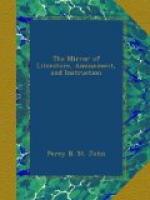The reader will probably recollect, in the well-known story, his reply to the lady by whom he had been hospitably entertained, but who refused to allow him the indulgence of his pipe. In vain he pleaded that such indulgence had always been kindly granted in the mansions of the highest nobility, and even in the presence and in the palace of his sovereign. “Madam,” said Dr. Parr to the lady, who still remained inexorable, “you must give me leave to tell you, you are the greatest—” whilst she, fearful of what might follow, earnestly interposed, and begged that he would express no rudeness—“Madam,” resumed Dr. Parr, speaking loud, and looking stern, “I must take leave to tell you, you are the greatest—tobacco-stopper in England.” This sally produced a loud laugh; and having enjoyed the effects of his wit, he found himself obliged to retire, in order to enjoy the pleasures of his pipe.
Dr. Parr was accustomed to amuse himself in the evening with cards, of which the old English game of whist was his favourite. But no entreaties could induce him to depart from a resolution, which he adopted early in life, of never playing, in any company whatever, for more than a nominal stake. Upon one occasion only, he had been persuaded, contrary to his rule, to play with the late Bishop Watson for a shilling, which he won. Pushing it carefully to the bottom of his pocket, and placing his hand upon it, with a kind of mock solemnity, “There, my Lord Bishop,” said he, “this is a trick of the devil; but I’ll match him: so now, if you please, we will play for a penny;” and this was ever after the amount of his stake. He was not, on that account, at all the less ardent in the prosecution, or the less joyous in the success, of the rubber. He had a high opinion of his own skill in this game, and could not very patiently tolerate the want of it in his partner. Being engaged with a party, in which he was unequally matched, he was asked by a lady how the fortune of the game turned? when he replied, “Pretty well, Madam, considering that I have three adversaries!”
Even ladies were not spared, who incurred his displeasure, either by pertinacious adherence to the wrong in opinion, or by deficiency of attention to the right and the amiable in conduct. To one, who had violated, as he thought, some of the little rules of propriety, he said, “Madam, your father was a gentlemen, and I thought that his daughter might have been a lady.” To another, who had held out in argument against him, not very powerfully, and rather too perseveringly, and who had closed the debate by saying, “Well, Dr. Parr, I still maintain my opinion.” He replied, “Madam, you may, if you please, retain your opinion, but you cannot maintain it.”
* * * * *
THE GATHERER
“A snapper-up of unconsidered trifles.”
Shakspeare.
* * * * *




